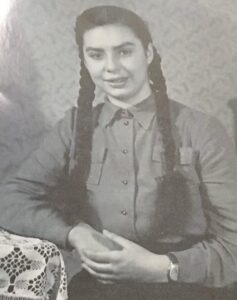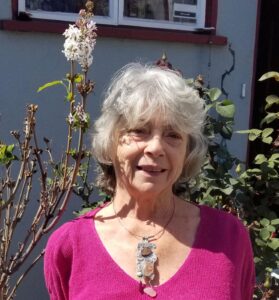

Eva Nathanson was born in January 1941 in Budapest, Hungary. She lived with her mother, Magdolna Ádám, and her father, Mozes Ádám, who ran a small factory. She remembers her parents and stepfather, Josef Rosenberg, fondly; often mentioning her mother’s skills with knitting and craftsmanship, as well as her parents’ loving nature. Her grandfather was part of the Underground, a secret organization that aided Jewish people in escaping Nazi-occupied countries.
Growing up in Hungary, Eva was made aware, even as a child, that something about her and her family was “different”. Despite the blatant anti-Semitism they faced as Hungarian Jews, her family was able to bond over their traditions and celebrate their Jewish heritage.
However, this quickly changed as almost her entire family was deported in 1943 by the Hungarian Nyilas (far-right nationalist party). Eva was merely two years old. At the time, she was living with her grandfather while her mother was in Budapest. Her father had already been forcibly taken to a labor camp where he was later killed.
Eva speaks of how her mother was able to rekindle her childhood traditions by forming community with other Holocaust survivors.
Following the deportation of her family, Eva and her mother went into hiding in Budapest with the help of a family friend that worked with the Underground. They were hidden in various neighborhoods around Budapest, constantly afraid of being found, until the city was liberated in 1945. Eva describes this period in her life as a series of “nightmares” which has had a profound effect on her life. Her mother would knit while in hiding to earn money for herself and her child, but hunger was common for them and their living conditions were extremely poor.
Eva to this day suffers with claustrophobia and has gone through periods of significant emotional distress from the trauma she experienced as a child.
In the spring of 1945, Eva and her mother, having barely escaped death at the hands of the Hungarian Nyilas, finally left hiding. Following the war, Eva fell very ill and for almost a year
her mother persevered and nursed her back to health. Around this time, her stepfather reached out to Eva’s mother in an attempt to fulfill his commitment to his lost friend (Eva’s father, Mozes). He married Eva’s mother and adopted Eva. Due to her poor health, Eva’s family decided to keep it a secret that her biological father had passed away and instead told her that Josef was her father who had returned after the war. It was not until much later into her adolescence that she discovered the truth about her father.
Despite her family being reunited and her improved health, things did not get easier for Eva. Her family was now living under Stalin’s regime and her father refused to join the ruling party. They still lived in fear and with meager resources. They were subjected to discrimination, not only because of their Jewish heritage, but because of their lack of support for the brutal dictatorship.
Eva describes how she was a misfit at school since she was one of the few Jewish students. She loved reading, music, theater and art and used these in order to escape the trauma she had gone through.
In 1956, Eva’s family escaped Russia to Austria and lived for almost 9 months inside a displaced person’s camp. Her stepfather’s brother was living in Los Angeles and so the family decided to immigrate to the United States when she was 16 years old. When they arrived in 1957, they moved to a neighborhood in East LA that had many other immigrants, although most of them spoke Spanish. With her parents working hard for little pay, Eva entered an ESL program and then began working full-time while going to school at night.
Eva now resides in Los Angeles, near her two children and grandchildren. She spent most of her career in the medical field and since retirement has been very active with her art (check out her Etsy page!), as an event coordinator in her Jewish renewal organization, and as a speaker sharing her life story.
Eva has spoken in front of hundreds of people about her story and, no matter how challenging it gets, she feels it is an important reminder of the dangers of bigotry which still threaten so many today.

